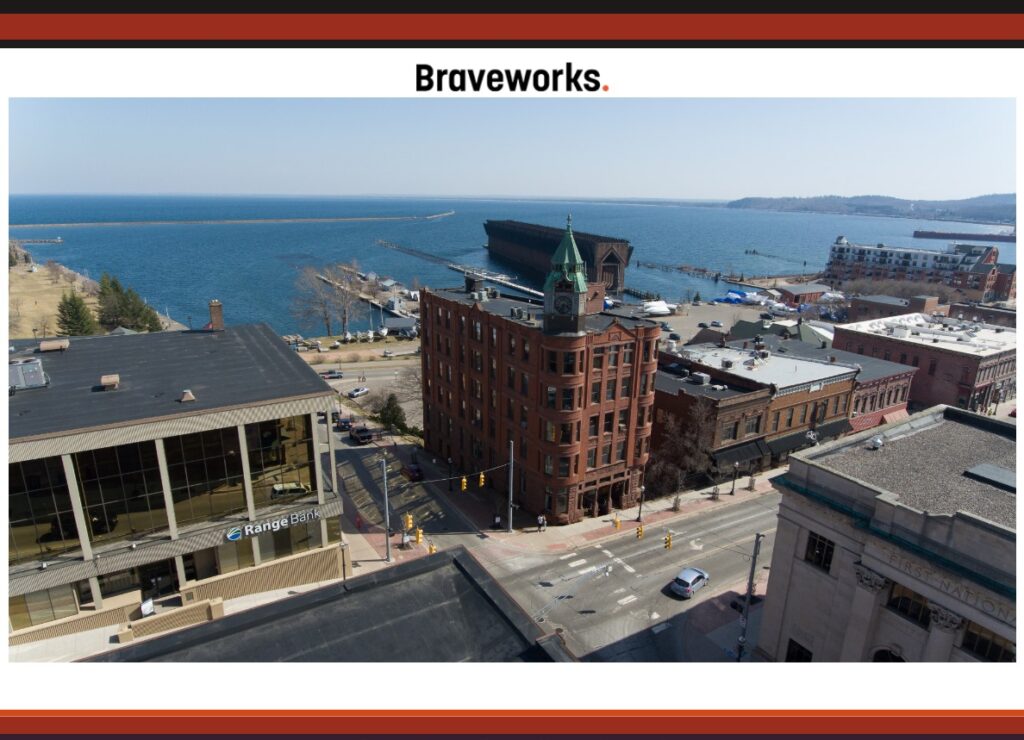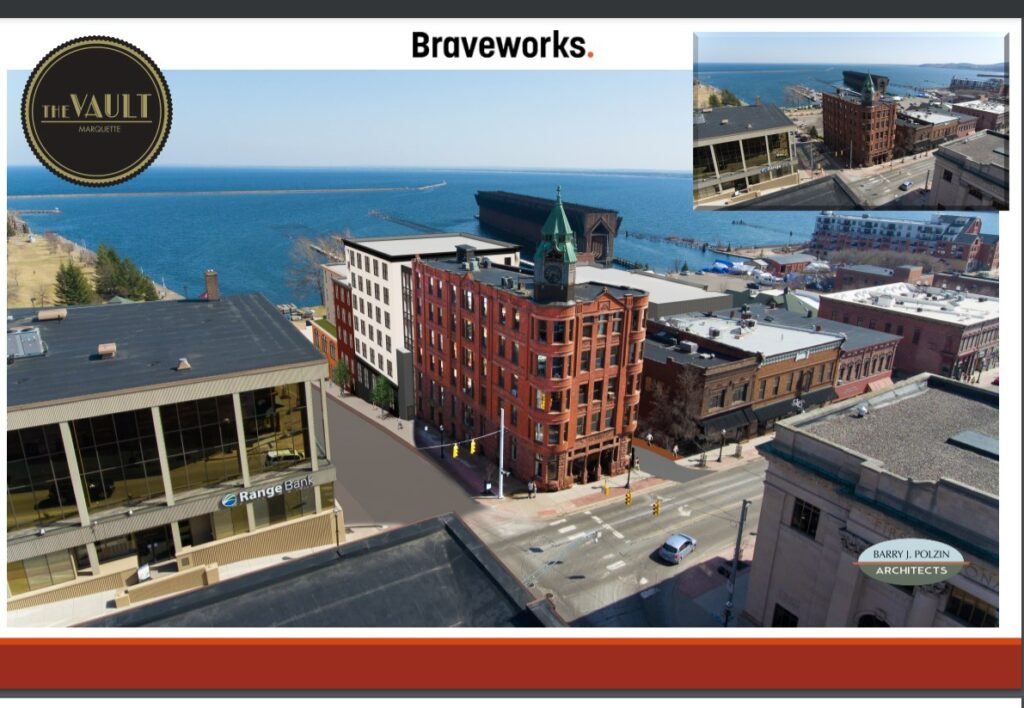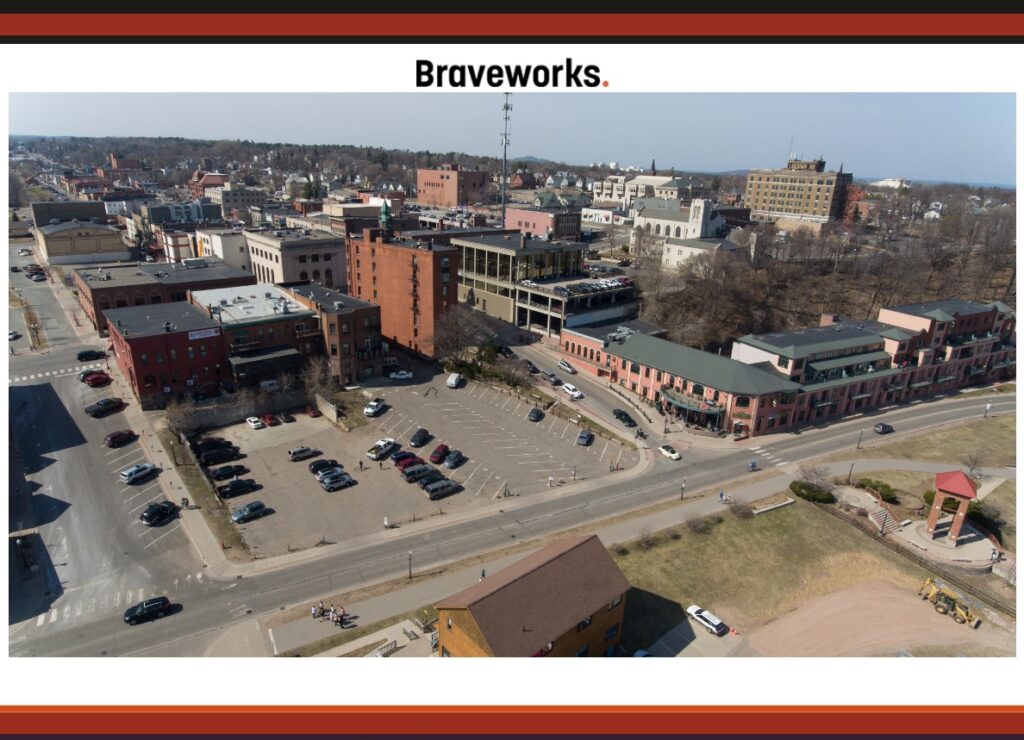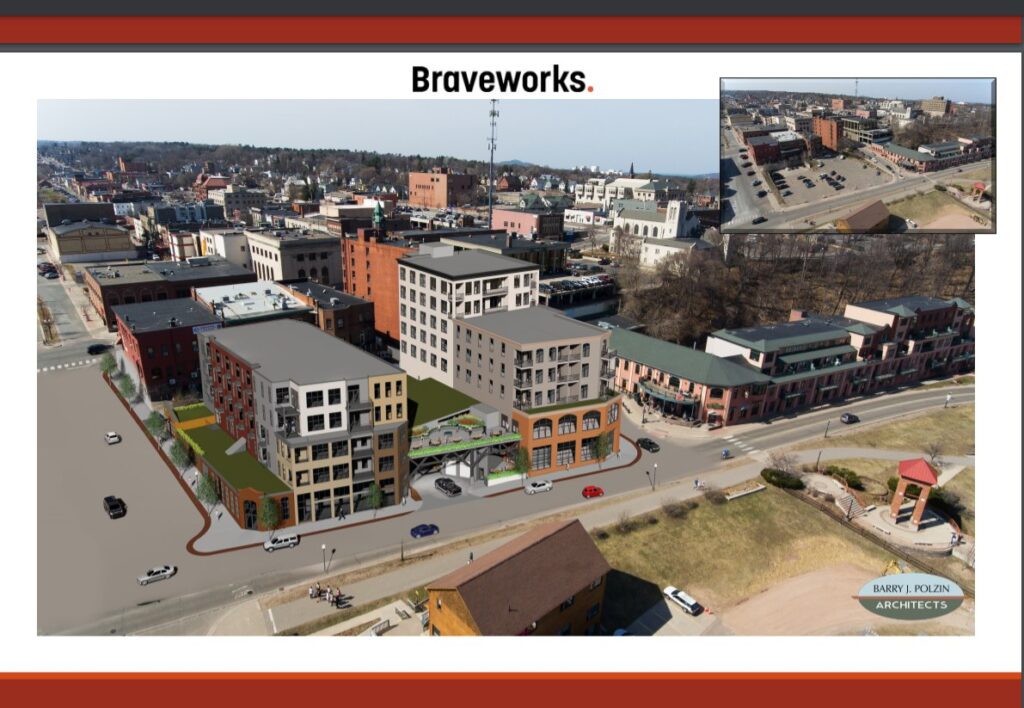Here are my vote explanations for the City Commission meeting on Monday, June 28. My apologies for posting these a couple days late – I have been dealing with an ankle injury since Tuesday night, and I have also had many other personal and professional commitments that had to take priority this week. As a result, I have not had time to sit down to write these vote explanations until the past 24 hours. You can watch the meeting video at https://www.youtube.com/watch?v=qGUvc15SnDQ&t=3667s.
Schedule a Public Hearing for Vault Marquette Brownfield Plan: YES (Passed 7-0)
This vote was only to schedule a public hearing on the Vault Marquette Brownfield Plan for the July 12 City Commission meeting (NOT for final approval of this project). Approval of this Brownfield Plan will be necessary if the proposed redevelopment of the Savings Bank Building and adjacent parking lots into a boutique hotel, apartment complex, and public parking structure is to move forward. The developer is Braveworks, and the architect is Barry Polzin. I still have many questions and concerns about this project, even after the City Commission work session on this topic which was held on Wednesday, June 30. Here are a few of the most important ones:
– How will taking out an $8.5 million infrastructure bond for the proposed parking structure impact the City’s finances and ability to bond for future projects/emergencies?
– How would this development impact traffic flow on Front, Lakeshore, Washington, and Main Street?
– Does the proposed design truly respect the unique, historic nature of the Savings Bank Building and the rest of downtown Marquette’s historic waterfront and skyline?
– At the June 30 work session, I appreciated that the developers committed to working with the MEDC to set aside at least 20% of the residential units in the proposed building as “workforce housing” units that would be affordable for households earning 80-120% of the Area Median Income (AMI), but how many workforce housing units would be produced, what would be the dimensions of these units, and what specific price points would they be offered at? Would City or County AMI figures be used to calculate affordable price points (this is important because the City of Marquette’s median income is significantly lower than Marquette County’s)?
– How many of the 220 spaces in the public parking structure will actually be available to the general public at any given time? The developers have stated that there will be 80-90 spaces available in the lot during peak usage after accounting for parking for hotel guests and long-term residential tenants. It is also unclear whether individuals or businesses will be able to reserve private parking spaces, or what the parking rates and hours of operation will be.
– Perhaps most importantly, what is the “opportunity cost” of approving this Brownfield Plan? In other words, what potential opportunities would the City be giving up if we approve this particular project? Is this the best potential use of this property, or could another developer come along in a year or two with a proposal that might be a better fit and yield more benefits to the community (for example, a 3-4 story building instead of a 5-6 story building, and/or a purely residential development which would allow dozens of workforce housing units to be produced instead of 7 or 8)? Would statutory bonding limits prevent the City from taking out Brownfield Redevelopment Bonds in the future to help redevelop other vacant properties in the City which are in more urgent need of redevelopment than this site, most notably the old Marquette General Hospital campus?
In the next couple of weeks, please contact me and my fellow Commissioners with your thoughts and any questions or concerns you have regarding this proposed development. Your voices truly could swing the Commission one way or another on this one. Our contact info can be found at www.marquettemi.gov/commission/#meetthecommission.
Accept Ad-Hoc Housing Committee Report: YES (Passed 7-0)

This was a procedural vote to accept the Final Report of the Ad-Hoc Housing Committee. The Housing Committee was created by the City Commission in January 2020 to study the issue of housing affordability in the City of Marquette and report back to the City Commission with our findings and a set of policy recommendations. I have served as the Chair of the Housing Committee for the past 18 months. In that time, the Housing Committee (with the invaluable support of City staff) has done a tremendous amount of research; gathered input from dozens of experts and stakeholders not only from Marquette but from across the state and country; released an Initial Report in January and listened to public feedback on that report; had lengthy and at times contentious debates about various housing issues in Marquette; and ultimately produced a Final Report to the City Commission, which was unanimously approved by the Committee at our final meeting on June 8, 2020. I was glad to see my colleagues vote unanimously to accept the report, and I look forward to holding a City Commission work session on the Final Report in the near future, and working to implement the Housing Committee’s many recommendations in the coming months and years. If we do so, I think we will succeed in our goal of making sure that Marquette remains an affordable place to live for City residents of all incomes.
You can read the Final Report for yourself at marquettemi.gov/adhochousingcommittee/
(Note: while the entire Final Report is 200 pages long when you include appendices, you really only need to read the first 23 pages to see all of our most important findings and our policy recommendations to the City Commission).
Move Ordinance #697 (Wastewater Treatment Plant Bonds) to July 12 Meeting: YES (Passed 7-0)
This was another procedural vote, this time to move an ordinance authorizing $8.5 million in bonds for upgrades to the Wastewater Treatment Plant to the July 12 City Commission meeting for a second public reading and final vote. The City is considering participating in the Clean Water State Revolving Fund (CWSRF), which would allow us to secure low-interest bonds to make much-needed upgrades to our biosolids handling system at the Marquette Area Wastewater Treatment Plant. The proposed $8.5 million in bonds would be for a 20-year period and would carry an interest rate of 1.875%. These upgrades would allow us to comply with EGLE requirements for biosolids handling, and also allow the City to earn about $200,000 in additional revenue each year by processing waste products from other communities for a fee. The bonds would also potentially be eligible for principal forgiveness after a few years, and the City of Marquette would only be responsible for 84% of the debt service payments, with the remainder paid by Marquette and Chocolay Townships.
This project is clearly necessary, and this is the lowest-cost way to finance it. However, I am seriously concerned about the impact this will have on utility rates in the City of Marquette. The most recent City of Marquette Utility Rate Study, which was presented to the City Commission by Raftelis in May 2020, incorporated these Wastewater Treatment Plant upgrades into its calculations, and it recommended significant Sewer Rate increases of 9.5% for the next two fiscal years (FY 2022 & 2023) and an increase in the monthly Fixed Sewer Charge of more than 50% in the same time frame. Those are large increases that many City residents simply cannot afford to pay, and that isn’t even considering the large rate hikes for Water (8-9% per year) and Stormwater (15.25% per year) that are also proposed for the next 4 years by the Utility Rate Study. This will require serious additional discussion by the City Commission as we prepare our FY 2022 budget over the next 3 months. However, for the time being I voted Yes so we could consider this proposed bond issue at our next meeting.
Authorize Capital Improvement & Refunding Bonds: YES (Passed 7-0)
Every year the City of Marquette issues Capital Improvement Bonds to fund major infrastructure upgrades, and we generally try to not take on more Capital Improvement Bond debt than we pay off each year, so these bonds do not result in a net increase in the City debt. This was a vote to issue up to $6,118,881 in Capital Improvement Bonds to replace City streets and water/sewer pipes over the next year. After some discussion, the City Commission approved a Resolution of Intent to issue bonds in this amount at our April 26, 2021 meeting (where I successfully advocated for the inclusion of both Shiras Drive and Newberry Street in the Capital Improvement Plan for this year). This is final step in the process of issuing these Capital Improvement Bonds. We also had an opportunity to refinance previous Capital Improvement Bonds from 2011 and 2012 to obtain a much lower interest rate for the remaining life of these bonds. This will save the City at least $164,000 over the next 6 years. This was a common-sense Yes vote for me.




